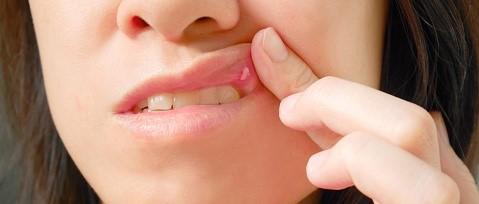
What causes mouth ulcers and how to treat them
Peer reviewed by Dr Krishna Vakharia, MRCGPAuthored by Amberley DavisOriginally published 27 Jan 2023
Meets Patient’s editorial guidelines
- DownloadDownload
- Share
- Language
- Discussion
Around one in five of us experience mouth ulcers, and although they may be painful or irritating, they're usually nothing to worry about. We share expert self-care tips to soothe and speed up recovery, as well as advice on when a mouth ulcer could be a symptom of something more serious.
In this article:
Continue reading below
What are mouth ulcers?
Mouth ulcers, sometimes called canker sores, are small, painful sores that can develop inside your mouth - inside your cheeks, on the roof of your mouth, on your tongue, or at the base of your gums. They can be raised, and may be red, yellow, white, or grey in colour.
Although they can cause some discomfort and pain - especially when pressed or nudged during eating - mouth ulcers are normally harmless and clear up by themselves within 1-2 weeks.
Not a cold sore
It's easy to muddle mouth ulcers and cold sores, but these aren't the same.
Appear outside the mouth, rather than inside – usually on your outer lips or around the outside of your mouth.
Are painful and dry blisters that tend to form a yellow crust.
Often begin with tingling, itching, or burning.
Are caused by a virus – and this makes treatment different to mouth ulcers.
What causes mouth ulcers?
If you develop a mouth ulcer as a one-off occurrence, the chances are it was caused by a minor trauma. Did you bite your cheek while brushing your teeth? Burn your tongue on a hot drink? Perhaps you have poorly fitting dentures?
In most cases, why some people have mouth ulcers that keep returning is more of a scientific mystery. This is called recurrent aphthous stomatitis, and the cause is not known.
It's thought that whatever causes mouth ulcers triggers an immune system reaction that results in the sore1. We also know that mouth ulcers aren't infectious - you can't spread them to anyone.
Continue reading below
What about mouth ulcer triggers?
Dr Ross Perry is a GP and medical director of Cosmedics. He explains that, while the cause of mouth ulcers isn't fully known, if you keep getting them it's likely that they are being triggered by one of the following factors:
Acidic foods.
When could it be a disease?
Sometimes, mouth ulcers can also be a symptom of another underlying health problem that needs to be identified and treated.
Dr Perry says: "Speak to your GP or dentist if your mouth ulcers gets larger, lasts for more than three weeks, causes you extreme pain, or if you develop a fever."
Can gut conditions cause mouth ulcers?
In rare cases, recurring mouth ulcers could be a symptom of some gastrointestinal diseases, such as Crohn’s disease and coeliac disease. If your mouth ulcers last more than 1-2 weeks and you notice other signs of Crohn's disease or coeliac disease around the same time, speak to your GP about getting tested.
Can cancer cause mouth ulcers?
Mouth ulcers that last a long time - three weeks or more - are the most common sign of mouth cancer2. This type of cancer is usually linked to heavy drinking and smoking, and cancerous ulcers most often appear under the tongue. You should also look out for the other symptoms of mouth cancer.
Remember, though, that this is still a relatively rare cause of mouth ulcers and the only way to know for sure is to get either your dentist or GP to examine the sore/s in question.
Continue reading below
How to treat mouth ulcers
As mouth ulcers are usually nothing to worry about, unless you have other concerning symptoms, you can wait to see if they clear up within a week or two.
Alternatively, to ease any pain or discomfort, Dr Perry says that there are self-care soothing methods you can use.
"You can purchase several products over the counter in pharmacies to treat mouth ulcers which will help to not only soothe but also speed up the recovery."
Options include:
Painkillers - available lozenges, mouthwash, sprays, and gels.
Antimicrobial mouthwash.
Corticosteroid lozenges.
"A home method is warm water with half a teaspoon of salt. A good gargle of this will help to relieve any pain," adds Dr Perry.
How to prevent mouth ulcers
If your mouth ulcers are caused by any of the common triggers, Dr Perry says these lifestyle hacks can help keep your mouth ulcer-free.
To keep mouth ulcers at bay:
Try and keep your mouth as clean as possible.
Use a high-quality toothbrush - to reduce the risk of damage when you brush your teeth.
Drink plenty of water – to prevent dehydration.
Eat a good balanced diet rich in vitamin A, C and E - your immune system may be weakened by mineral and vitamin deficiencies. Eating plenty of fruit and vegetables will help.
Further reading
Patient picks for Other oral problems

Oral and dental care
What’s causing your morning breath?
Morning breath, when you wake up with a dry and unpleasant taste in your mouth, is a common inconvenience. Here we let you know what you can do about it - and when it's a sign that something is wrong.
by Amberley Davis

Oral and dental care
How to take care of chapped lips this winter
The winter months can wreak havoc on our lips, leaving them dry, flaky and sore. So why does this time of year cause chapped lips - and is there anything we can do to prevent them?
by Victoria Raw
Continue reading below
Article history
The information on this page is peer reviewed by qualified clinicians.
27 Jan 2023 | Originally published
Authored by:
Amberley DavisPeer reviewed by
Dr Krishna Vakharia, MRCGP

Ask, share, connect.
Browse discussions, ask questions, and share experiences across hundreds of health topics.

Feeling unwell?
Assess your symptoms online for free
Sign up to the Patient newsletter
Your weekly dose of clear, trustworthy health advice - written to help you feel informed, confident and in control.
By subscribing you accept our Privacy Policy. You can unsubscribe at any time. We never sell your data.